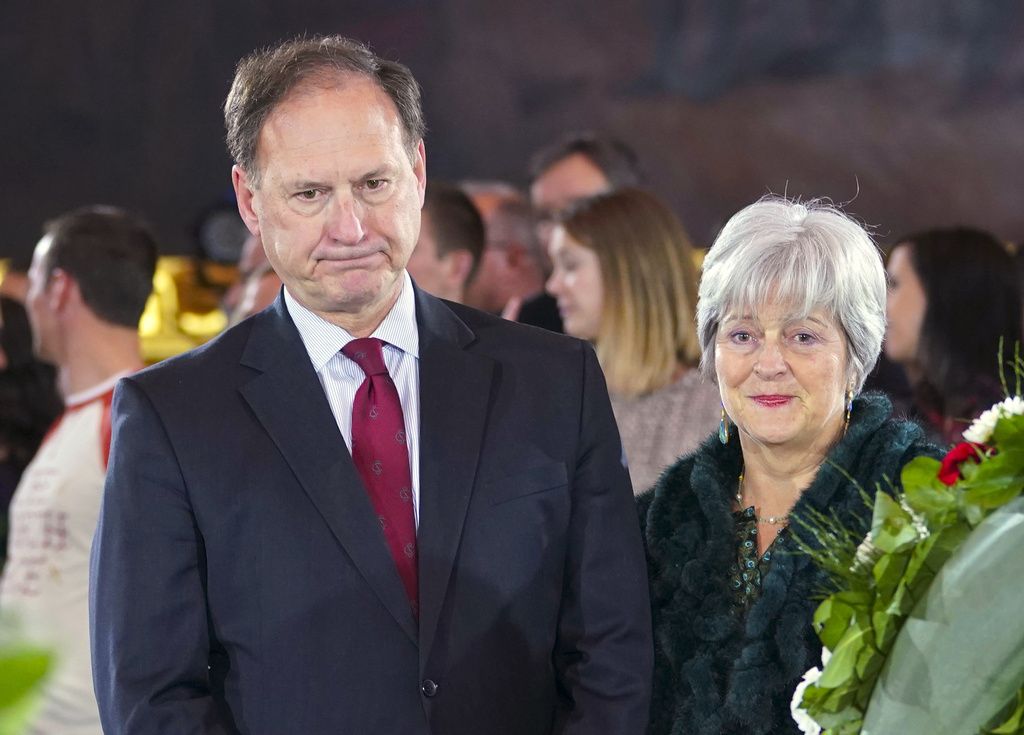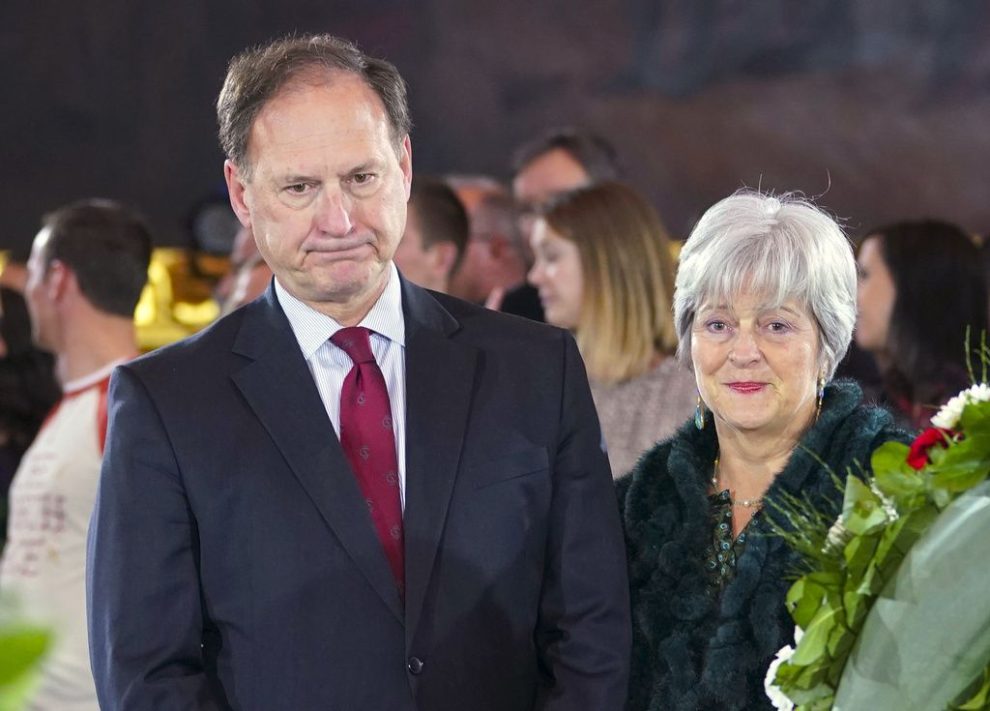Supreme Court Justice Samuel Alito is warning that the high court is moving too quickly on politically fraught cases, raising concerns in a dissent that the justices are short-circuiting proper judicial review over expediency.
Alito’s fiery rebuke came Saturday evening, nearly 24 hours after his colleagues allowed an emergency order halting the Trump administration’s plan to deport certain migrants under the 1798 Alien Enemies Act.

“This order was issued without any explanation or consideration of the far-reaching implications,” Alito wrote in a dissent published just before 11:30 p.m. Saturday evening. “We are expected to act as a court of law, not as a reflexive political body.”
Alito was responding to the majority’s unsigned order that arrived just after midnight Saturday, only hours after the American Civil Liberties Union’s late-Friday filing. The majority’s order temporarily blocked deportations of Venezuelan migrants from Texas without providing any explanation, and it came at nearly the same time the appeals court published its separate ruling.
Legal experts question whether Supreme Court had jurisdiction to act
Several prominent legal experts have raised questions about whether the Supreme Court even had jurisdiction to act, given that there was no ruling from the district court.
“It’s not at all clear to me that the Supreme Court had any appellate statutory jurisdiction in this case,” said South Texas College of Law professor Josh Blackman in a blog post for Reason‘s Volokh Conspiracy blog just after midnight on Easter. “If the Court wanted to issue any relief, it would have to satisfy itself there was a constructive denial. I doubt any such finding was made. The Court fell for the ACLU’s petition hook, line, and sinker.”
Other legal experts echoed Alito’s concern that the justices are bypassing traditional procedures to reach politically sensitive decisions.
“What Justice Alito is saying is, we need to get back to regular order because these cases are coming to us without a record,” George Washington University Law School professor Jonathan Turley said on Fox News. “Alito is basically saying, I’m having enough of this.”
Atlanta-based attorney Phil Holloway criticized the Supreme Court’s process more bluntly, writing on X, “Alito understands that allowing the ACLU to — leapfrog lower courts to get a SCOTUS injunction — based on wrong application of existing law on class certification — without even hearing from the opposing party — in the middle of the night — is how banana republic courts work.”
The Trump administration has invoked the Alien Enemies Act, a centuries-old wartime law, to fast-track removals of suspected gang members. Civil liberties groups argue the migrants could face torture or indefinite detention in El Salvador’s mega-prison, where the Trump administration has sent migrants removed under the law.
Did any other justices side with Alito and Thomas?
Only Alito and Justice Clarence Thomas publicly dissented from the Supreme Court’s intervention.
Because justices aren’t required to disclose their votes on emergency applications, some legal analysts noted that others on the bench may have quietly agreed with them.
Blackman speculated that Justices Neil Gorsuch and Brett Kavanaugh may have supported the dissenters’ view but chose not to side publicly with Trump.
Legal commentator David Lat, however, pointed out on his Original Jurisdiction blog that Gorsuch’s history of emphasizing due process — especially in immigration matters — may explain his silence without implying political maneuvering.
Detractor says Alito had to ‘mischaracterize’ government’s intent to make his point
Still, not all legal experts agreed with Alito’s reading of the Supreme Court’s authority.
Georgetown University law professor Steve Vladeck argued in his One First blog that the Supreme Court did have appellate jurisdiction and that the ACLU’s request met the standards for emergency relief, especially given evidence that deportations were imminent.
“Alito’s dissent implies nefariousness where none exists,” Vladeck wrote, adding that the justice “misstates key facts and ignores recent rulings he himself joined” that established the procedural protections at issue.
Vladeck took particular issue with Alito’s claim that the other justices’ order was “prematurely granted” and quibbled over Alito’s characterization that the Justice Department had assured a lower court that no deportations were imminent.
But during a separate emergency hearing Friday evening before U.S. District Judge James Boasberg, DOJ attorney Drew Ensign said only that no removals were scheduled for Friday or Saturday, while explicitly reserving the government’s right to begin deportations thereafter.
That distinction matters, Vladeck argued, because reports and video later confirmed that dozens of detainees were loaded onto a bus Friday night in apparent preparation for a removal flight — one that may have taken off shortly after midnight, depending on whether the Supreme Court had intervened in time.
“The premise of Alito’s dissent is that the Court acted too hastily,” Vladeck wrote. “But to get there, he had to mischaracterize what the government told the lower court and ignore credible evidence that removals were already in motion.”
Is the Roberts court leaving out ‘procedural regularity?’
Despite such rebuttals, Alito’s dissent is resonating with conservatives who say the Supreme Court’s handling of the case reflects a troubling break from legal norms. Blackman, who closely tracked the timeline, noted that the Supreme Court issued its order almost simultaneously with the 5th Circuit’s — despite knowing the lower court ruling was just minutes away.
He warned that stepping in before either the district or appellate court had formally acted could raise serious constitutional problems under Marbury v. Madison, the landmark case defining judicial authority.
“If any statute purports to grant what ‘appellate’ jurisdiction that is in fact ‘original’ jurisdiction, then we have a Marbury problem,” Blackman wrote. “Has there ever been a case where the district court did not issue any judgment, the circuit court (at the time the court voted) took no action, and the Supreme Court still exercised jurisdiction? I think the answer is no, but I welcome any suggestions.”
Blackman also compared the decision to a recent incident in a U.S. Agency for International Development case, where the justices issued instructions to a lower court despite denying relief, calling it “an advisory opinion of the worst sort.”
SUPREME COURT BLOCKS TRUMP FROM DEPORTING FOREIGN NATIONS UNDER ALIEN ENEMIES ACT
Blackman argued that the justices appear to have discarded basic legal procedure in a rush to block the Trump administration, writing that the “Supreme Court has clearly abandoned any pretense of procedural regularity at the same time they are denying the Trump Administration the presumption of substantive regularity,” calling it a “fly-by-night operation.”
























